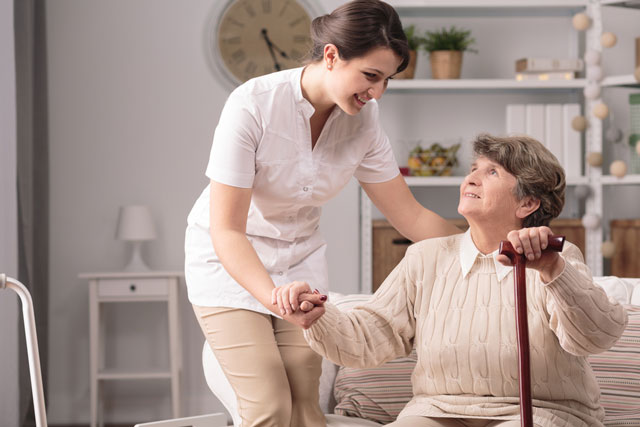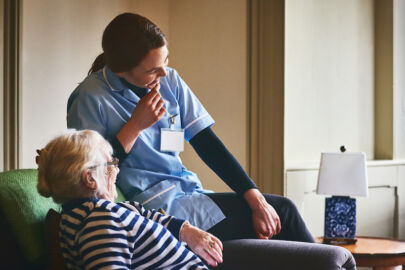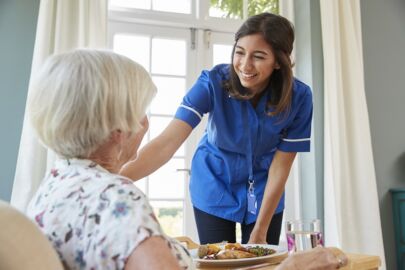Cleaning, grocery shopping, cooking, helping with medical appointments, and managing medications are some of the duties of an elderly caregiver. But your responsibilities will ultimately depend on your loved one’s health and needs.
What is a caregiver?
A caregiver cares for the health and well-being of someone who needs help with daily tasks and activities. Your aging loved one may need a caregiver because of an injury, mobility or memory issues, illnesses, or chronic conditions that make everyday chores more challenging.
Depending on the level of support provided, long-term caregiving can take a toll on the caregiver’s physical and emotional health. Consider your loved one’s condition and your health and skills to determine whether in-home care is appropriate or if more specialized care is needed.
Senior caregiver duties and responsibilities
Your caregiver duties may vary each day, but some basic tasks remain the same when caring for an aging parent or senior loved one.
Take a look at these top caregiver responsibilities:
1. Assess medical needs
Checking on your senior loved one’s health is an important caregiver responsibility. You may need to help keep track of medical appointments, manage medications and chronic conditions, or assess pain levels. It’s a good idea to discuss your loved one’s health with their doctor and other health professionals regularly.
2. Prepare a care plan
Preparing a care plan that addresses your senior loved one’s care needs and goals can be helpful when you begin your caregiving journey. A plan can help you determine how many hours of care a day your loved one will require and whether you need additional help to ensure his or her health and safety.
3. Assist with basic needs
Memory and mobility issues can make even basic needs such as eating, bathing, grooming, and toileting — commonly referred to as “activities of daily living,” or ADLs — difficult. Check in often and pay attention to specific signs andchanges to determine if your loved one needs extra help.
4. Provide companionship
One of the most essential but sometimes overlooked parts of caregiving is companionship. Feelings of loneliness in older adults can lead to serious health consequences including depression. When you care for an aging loved one, you are creating opportunities to strengthen your bond and connection.
5. Help with housekeeping
As your loved one ages, maintaining a home can become increasingly difficult. Older adults may need help with dishes, taking out the garbage, or vacuuming. If your loved one lives in a house, yard work, snow shoveling, and daily maintenance may be too much for them to handle even with your help. Consider whether your loved one would benefit from the convenience and support of a senior living community.
6. Monitor medications
Older adults often take several prescription medications to treat chronic conditions. Your loved one may need help keeping track of their medication list, understanding drug interactions, and taking prescribed dosages at the right time. You can help lower your loved one’s risk of overmedicating by creating reminder systems and monitoring his or her medications.
7. Assess your care plan regularly
As circumstances surrounding you and your loved one inevitably change, the care plan will need to be adjusted. Review it regularly to determine what’s working, what’s not, and what needs to be adapted. Keep in close contact with your loved one’s doctor and other health professionals to discuss any changes.
8. Prepare meals
Food preparation can become increasingly difficult with age. If your loved one lives alone, they may lack the energy or motivation to cook. In some cases, memory and balance issues may make cooking unsafe. As a caregiver, you can help with grocery shopping, preparing meals or finding alternatives to ensure your loved one gets proper nutrition.
9. Assist with transfer and mobility
Falls are a major risk to the health of older adults. Your loved one may have difficulty moving or transferring — from their bed in the morning to a chair in the afternoon, for instance. As a caregiver, you can take steps to help prevent falls and help your loved one stay safe and comfortable.
10. Provide transportation
As your loved one ages, public transportation or driving may no longer be safe options. You may need to look for senior transportation alternatives to get your loved one to doctor’s appointments and other activities.



